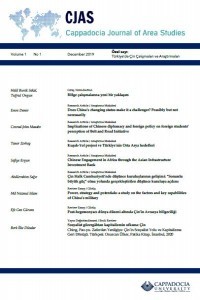On dokuzuncu yüzyıl Doğu Asya Sistemi’nde dengeleme politikaları: Kore-Rusya ilişkileri örneği
Doğu Asya sistemi, Rus imparatorluğu, Kore Krallığı, Japon İmparatorluğu, dengeleme politikası
The balance of power politics in East Asia System in the nineteenth century: a case of Korean- Russian relations
East Asia system, Russian Empire, Korea Kingdom, Japan Empire, balance of power,
___
- Auslin, Michael R. 2004. Negotiating with Imperialism: The Unequal Treaties and the Culture of Japanese Diplomacy. Cambridge: Harvard University Press.
- Buzan Barry, and Richard Little. 2000. International Systems in World History: Remaking the Study of International Relations. Oxford: Oxford University Press.
- Curzon, George N. 1894. Problems of the Far East: Japan-Korea-China. London: Longmans.
- Department of State. “A Guide to the United States’ History of Recognition, Diplomatic, and Consular Relations, by Country, since 1776: Korea” Erişim Nisan 20, 2020. https://history.state.gov/countries/korea.
- Finch, Michael. 2008. Min Yonghwan: The Selected Writings of a Late Choson Diplomat. Berkeley: University of California Press.
- Group 3, “The Treaty of Aigun,” Russia in Global Perspective.
- Erişim: Mayıs 31, 2020, http://dighist.fas.harvard.edu/projects/russiaglobal/items/show/23.
- Holcombe, Charles. 2016. Doğu Asya Tarihi: Çin, Japonya, Kore; Medeniyetin Köklerinden 21. Yüzyıla Kadar. Çev. Muhammed Murtaza Özeren. İstanbul: Dergâh Yayınları.
- Kang, David C. 2005. “Hierarchy in Asian International Relations: 1300-1900” Asian Security 1(1), 53-79.
- Kang, David C. 2010. “Hierarchy and Legitimacy in International Systems: The Tribute System in Early Modern East Asia” Security Studies 19(4), 591-622.
- Kim, Hyung-eun. 2009. “Royal refuge with Russia” Korea Joonggang Daily. Temmuz 26. Erişim Mayıs 26, 2020. https://koreajoongangdaily.joins.com/news/article/article.aspx?aid=2907922.
- Kyung, Moon H. 2018. Kore Tarihi. Çev. Ayşe Su Doğru. İstanbul: Feylesof Kitap.
- Koda, Yoji. 2005. “THE RUSSO-JAPANESE WAR: Primary Causes of Japanese Success” Naval War College Review 58 (2), 10-44.
- Kim, Seung-young. 2005. “Russo–Japanese Rivalry Over Korean Buffer at the Beginning of the 20th Century and its Implications” Diplomacy and Statecraft 16 (4), 619-650.
- Lee, Chang-hoon. 2016. “Franco-Korean relations in the 19th century” The Korea Herald. Haziran 6. Erişim Nisan 22, 2020. http://www.koreaherald.com/view.php?ud=20160606000322.
- Lee, Kenneth B. 1997. Korea and East Asia: The Story of a Phoenix. Connecticut: Praeger Publications.
- Lowensteinova, Miriam ve Blanka Kašparova. 2018. “1896 Russia Through diaries of Min Yonghwan and Yun Ch’iho” Р. К. Танглалычева, С. О. Курбанов, И. С.
- Ланцова, А. В. Ковш, А. А. Гурьева (ed.), КОРЕЯ И РОССИЯ: ОБЩЕСТВО, ПОЛИТИКА, ИСТОРИЯ, КУЛЬТУРА, 380-390. St. Peterspurg: Publishing house of St. Petersburg University.
- March, Patrcik G. 1996. Eastern Destiny: Russia in Asia and the North Pacific. Connecticut: Greenwood Publishing Group.
- Osiander, Andreas. 2001. “Sovereignty, International Relations, and the Westphalian Myth” International Organization 55 (2), 251-287.
- Ro, Kwang Hai, (1966). “Power Politics in Korea and Its Impact on Korean Foreign and Domestic Affairs, 1882-1907” Ph.D Theses. The University of Oklahoma.
- Robinson Michael E., 2007. Korea’s Twentieth-Century Odyssey: A Short History. Honolulu: University of Hawai’i Press.
- Sander, Oral. 2017. Siyasi Tarih: İlkçağlardan 1918’e. Ankara: İmge Kitabevi.
- Synn, Seung Kwon. 1981. “Korean-Japanese Relations, 1894-1904 (II)” Korea Journal (Mart 1981), 4-20.
- Shimamoto, Mayako; Ito, Koji; Sugita, Yoneyuki. Historical Dictionary of Japanese Foreign Policy. Rowman & Littlefield, 2015.
- Zvetina, Edmund J., (1952). "Imperial Russian Interest and Intervention in Korea, 1860-1903" Master's Theses. Paper 1340. http://ecommons.luc.edu/luc_theses/1340.
- Başlangıç: 2019
- Yayıncı: Kapadokya Üniversitesi
ABD Başkanlık seçimleri üzerine
On dokuzuncu yüzyıl Doğu Asya Sistemi’nde dengeleme politikaları: Kore-Rusya ilişkileri örneği
Demokrat Parti dönemi Türkiye-İran ilişkilerinin kronolojik olarak incelenmesi
Klasik jeopolitik yaklaşımlar üzerinden Rusya’nın Suriye politikaları
Afgan sığınmacıların göç ve uyum süreci: Sivas uydu kenti örneği
Çin’de 2020 yılında yoksulluğu önleme çabaları üzerine değerlendirmeler
Rus istisnacılığının inşası: Rus akademisinde ilk Oryantologlar
İsrail: efsaneler ve gerçekler
ABD’nin Biden dönemi Çin Politikası: Asya’ya Dönüş 2.0?
Trump Çağı Türk dış politikası: istisna mı uzun vadeli bir değişimin habercisi mi?
